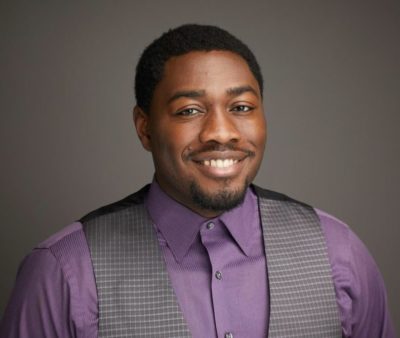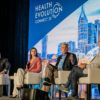In February 2020, I was asked to step beyond my role as Chief Operating Officer at Zuckerberg San Francisco General Hospital to lead the COVID-19 Operations Center for San Francisco’s Department of Public Health. From the discovery of the Bay Area’s first local transmission case, to the arrival of the cruise ship with 21 confirmed cases, to implementing shelter-in-place, our team metamorphosed with each stage of the pandemic. Though change was constant and rapid, our focus on protecting the most vulnerable was absolute.
I’ve seen the best of humanity in our health workers, disaster service workers and first responders. The resolve to serve all has burned bright during the darkest periods of the pandemic. In May 2020, of the most densely-populated cities in the US, San Francisco had the lowest COVID-19 death-rates (4.2/100,000), new case-rates (2.5/1,000) and highest testing-rates (1.6/1,000). It’s been the most humbling experience of my career.
Yet, another world I inhabit was on fire. In a time we all needed to be united against COVID-19, each month since I was called to lead, a black person was murdered for simply existing. Ahmaud Arbery, Breonna Taylor and George Floyd. Never forget there are many more that don’t make the news.
When relocating to the Bay Area for a new job, my family chose to live in Oakland. We love its diversity. We are never the only. We are never the other. Years ago, I commuted 70 miles round trip to San Mateo. Public transportation was not a feasible option. I had a formula to defeat traffic: Get in the car by 5:00 am, get in the car before 5:00 pm. I’d never been on the road this long; It was dark when I left and dark when I returned. I also had a routine to be safe. Each day, I recorded myself going to work and returning home… Just in case. I made sure my hospital ID was clipped to my collar and visible (eliminating the need for sudden moves)…Just in case. Getting home and deleting three hours footage of me driving was my quality and safety indicator. I never shared this routine with my family, friends or colleagues. Why share that every day I factored in the possibility of not coming home? The journey between my home and hospital was a perilous world. The letters following my name do not protect me from death by racism. The burden was mine alone.
The compartmentalization of my multiple worlds shattered when Philando Castile was killed. While in the car with his girlfriend and daughter, seven shots were fired at point blank range. Moments after the shooting, his daughter repeatedly begged her mother to stop screaming, terrified she’d be shot too. She was only four years old. The video of him dying hit me hard. I was unwise watching it before my commute. Unable to contain my grief, I pulled over on Bridge 92 and wept. It could’ve been me. That day at my hospital, I opened up our executive team meeting by reflecting on Philando’s death, what it meant to me and the impact health care leaders can have. Our operations revolve around healing, life and death. I believe we have a duty to advance equity.
Currently, the murder of George Floyd has struck a deafening chord and America is horrified. However, for Black people, it was validation that our nightmares are memories. Our fears are facts. Our safety is fiction. Although it’s been heartening reading solidarity statements from many that are usually silent, I can’t help wondering why my life suddenly matters more now.
At the height of the pandemic, while sheltering-in-place, did America get a minuscule glimpse into the perpetual state of vulnerability Black people live in? You had your guard up because every time you left the house was risky. You went for walks, then your neighbor crossed the street for their own safety when they saw you coming. Your kids wanted to play outside in their own neighborhood and you explained why they should be vigilant and protect themselves from a concept they didn’t fully understand. Death saturated the news, you knew someone that knew someone dying. You realized it could be you or your loved one in the statistics. Your privileges were taken away. You were uncertain how you’d survive the future. Did it really take a pandemic for you to see us?
During these harrowing times, I’ve appreciated the emotional support of white friends and colleagues. However, I’ve struggled to answer the “How are you doing?” conundrum. How do you convey the feeling of desolation when you’re reminded regularly that your life doesn’t matter?
For Black health workers, the desolation is exponential. Our lives are dedicated to a world we are the least likely to have access to, the least likely to heal in and the least likely to thrive by most indisputable metrics. In America, Black women are 3.3 times more likely than whites to die from pregnancy complications. Despite much uncertainty with SARS-COV-2, Black people are 2.4 times more likely than whites to die from COVID-19. Black health workers behold the aftermath of injustices upon Black lives. We lift the pain. We cradle the trauma. We embody their stories. We comfort and prepare them for the battles we know they’ll face when they leave the hospital or exam room. They are us. Every day, Black health workers wake up and choose to go into a world where disparities are pervasive and lethal. We stay in that world to re-write the narrative.
In health care, we acknowledge history impacts outcomes and we can’t have healthy communities without social Justice. Accepting racism as a public health issue is no longer enough. We must become anti-racist organizations. I’m inspired by how health workers rallied at the height of the pandemic. Health organizations were sharing data, resources, practices and constantly iterating with a unified commitment to testing, tracing and treating. Imagine a world where we harnessed that resilience then channeled it towards eliminating disparities. We’d prioritize and invest in equity the same way we do quality and safety. Our impact could shape generations and drive legislation to end the death-by-racism pandemic. We did it for smoking. Why not this?
As we mourn George, Breonna, Ahmaud and many others, I hope we remain committed to call out and counter inequities and injustices when this stops trending. I hope leaders walk the talk and assess whether their teams reflect their clients. I hope America finally understands why Colin Kaepernick took a knee. On June 2nd, 2020, at San Francisco General Hospital, hundreds of us gathered in vigil by taking a knee in memory of murdered black men and women. Since then, I’ve seen images of thousands of health workers do the same across America. I believe health care can and should lead by example. We have much to do and a long way to go. All lives can’t matter until Black Lives Matter.









